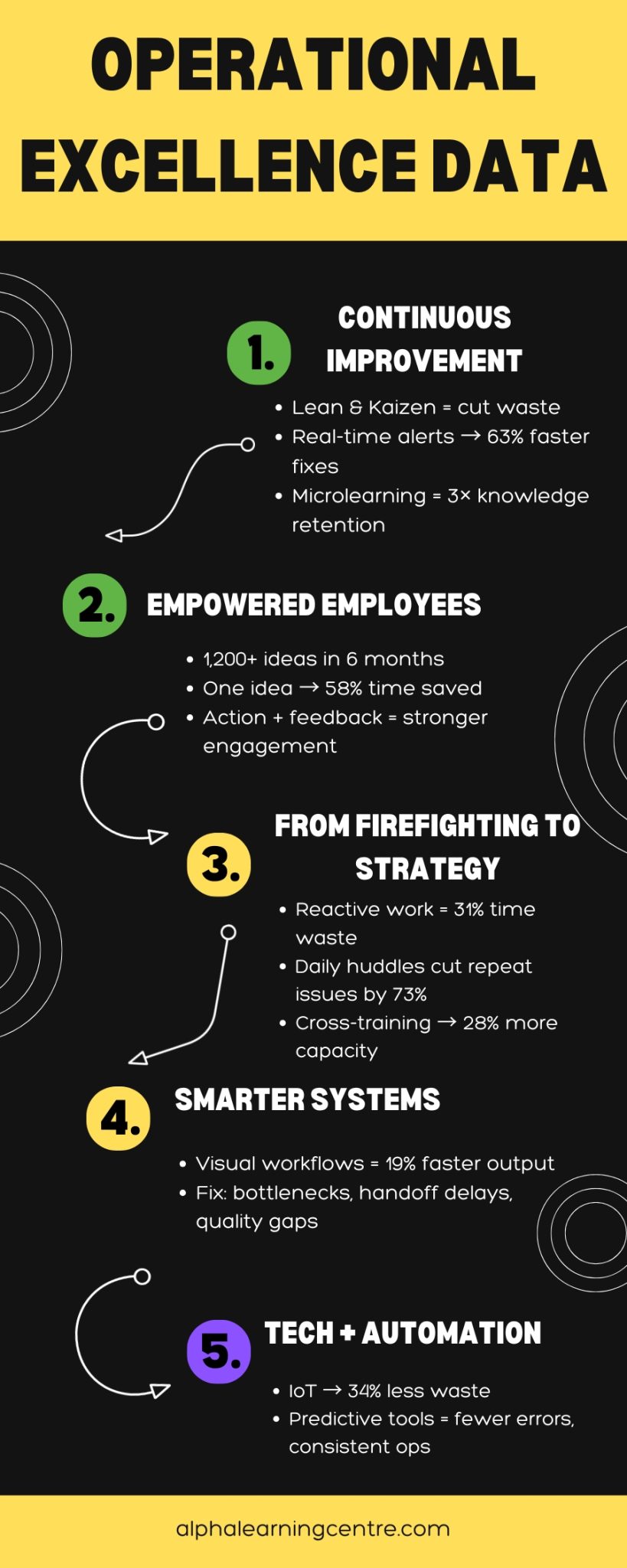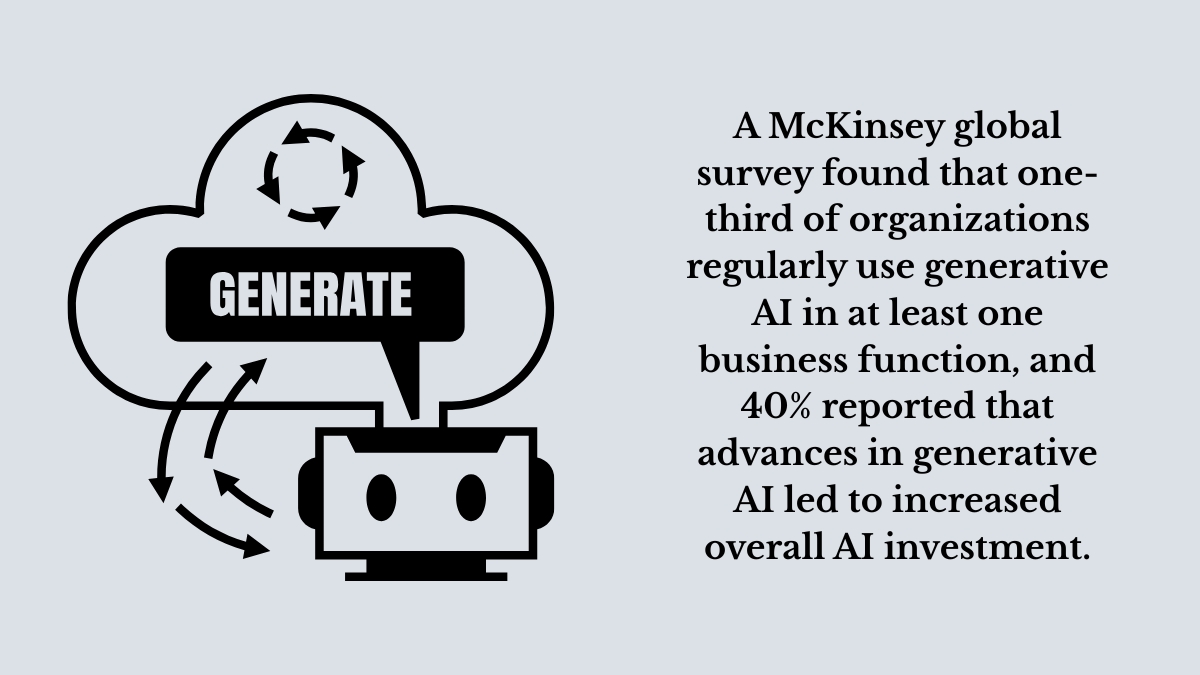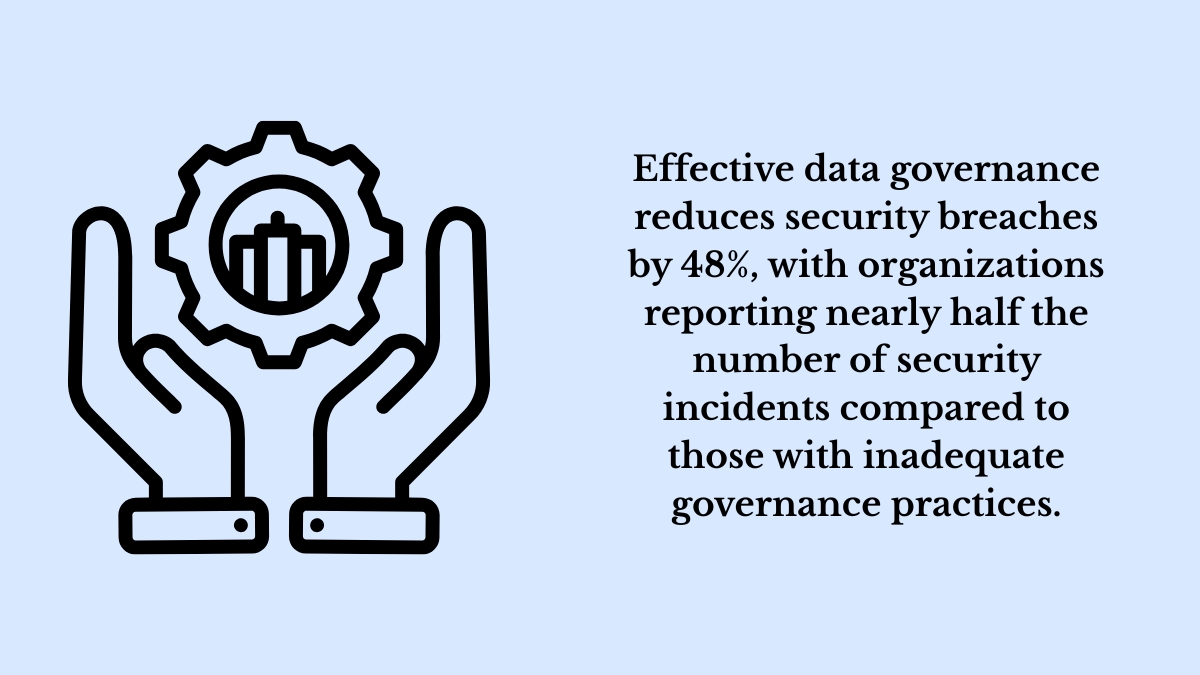In today’s competitive business landscape, achieving operational excellence is crucial for organisations seeking to stay ahead. Recent findings indicate that less than a third of data and analytics leaders are confident that their executives understand the link between investing in data and maintaining a competitive edge.
Despite significant technological advancements, only 44% of analytics teams are effective in delivering value to their organisations. We will explore how data-driven decision-making can bridge this gap, enabling businesses to achieve remarkable efficiency gains.
By examining the fundamental principles of operational excellence and the role of data in driving performance improvements, we can identify key strategies for success.
Key Takeaways
- Understanding the importance of operational excellence data in driving business success.
- Recognising the disconnect between data collection and actionable insights.
- Identifying leadership strategies that align data initiatives with business objectives.
- Exploring the essential elements of data-driven operational excellence.
- Learning from real-world examples of organisations that have achieved sustainable business performance.

Understanding Operational Excellence in Today’s Business Landscape
In today’s fast-paced business environment, understanding operational excellence is crucial for organisations seeking to improve their efficiency and effectiveness. Operational excellence is a management methodology that focuses on improving efficiency, effectiveness, and agility within an organisation.
Defining Operational Excellence and Its Core Principles
Operational excellence (OpEx) is centred around continuous improvement within processes and across functional activities to maximise the flow of value to customers. The core principles that underpin operational excellence include customer-centricity, lean thinking, process standardisation, and employee empowerment. By adopting these principles, organisations can achieve significant improvements in their operational performance.
| Core Principle | Description | Benefit |
|---|---|---|
| Customer-Centricity | Focus on delivering value to customers | Enhanced customer satisfaction |
| Lean Thinking | Eliminating waste and optimising processes | Improved efficiency |
| Process Standardisation | Standardising processes for consistency | Reduced variability and errors |
| Employee Empowerment | Empowering employees to drive improvement | Increased employee engagement |
The Evolution of Operational Excellence in Modern Business
The concept of operational excellence was initially developed by Dr. Joseph Juran in the 1970s, primarily applied to manufacturing processes. Over time, it has evolved to encompass broader business applications across diverse sectors, including service industries and knowledge work. Today, operational excellence demands a more integrated approach that addresses both technical systems and human factors.
As the business landscape continues to evolve, organisations must adapt their approach to operational excellence to stay competitive. This involves embracing a culture of continuous improvement and leveraging data-driven insights to drive decision-making.

The Critical Role of Operational Excellence Data
As organisations strive for operational excellence, the importance of data in guiding their efforts cannot be overstated. Operational excellence relies heavily on data to make informed decisions, enabling organisations to identify areas for improvement, measure progress, and base decisions on evidence rather than assumptions.
How Data Transforms Operational Decision-Making
The integration of data into operational decision-making processes revolutionises the way organisations operate. By leveraging data-driven decision making, businesses can move away from relying on gut feelings and assumptions, instead opting for data backed insights. This transformation leads to more consistent and predictable outcomes, as data analysis provides a clear understanding of operational processes and performance.
With robust data collection and analysis systems in place, organisations can achieve a more comprehensive view of their business performance. This, in turn, enables more agile responses to changing market conditions and operational challenges. By examining the impact of data on operational decision-making, it becomes clear that data visibility across all levels of an organisation is crucial for driving improvement.
Key Data Metrics That Drive Operational Excellence
High-performing organisations track a range of key metrics to measure operational excellence. These include efficiency indicators, quality measures, cycle times, and customer satisfaction metrics. By monitoring these metrics, businesses can gain valuable insights into their operational processes and identify areas for improvement. The effective use of these metrics enables organisations to drive operational excellence, leading to enhanced performance and competitiveness.
Leading companies establish data hierarchies that connect operational metrics to strategic business outcomes, creating clear lines of sight from frontline activities to executive dashboards. This approach ensures that operational data is aligned with broader business objectives, driving overall excellence and operational excellence.

Why Only 44% of Analytics Teams Deliver Effective Value
Despite significant investments in data analytics, a concerning statistic reveals that only 44% of analytics teams successfully deliver effective value to their organisations.
The issue at hand is complex, involving multiple factors that hinder the ability of analytics teams to drive meaningful business outcomes. Without a clear understanding of the entire data value chain, from collection to analysis and decision-making, efforts to improve operations in one area can inadvertently cause issues in other areas.
Common Barriers to Data-Driven Operational Excellence
Several barriers prevent companies from realising the full potential of their data investments. These include siloed information, poor data quality, and a lack of analytical skills within teams. Additionally, disconnects between data collection activities and business objectives lead to wasted resources and missed opportunities for operational improvements.
Bridging the Gap Between Data Collection and Value Creation
To overcome these challenges, organisations must align their data strategy with business priorities, engage stakeholders effectively, and ensure the practical application of insights. By doing so, companies can bridge the gap between data collection and value creation, driving operational excellence and achieving measurable performance improvements.
The key to unlocking the true potential of data lies in creating a culture that values data-driven decision-making and fosters collaboration across processes and teams within the organisation.

Leadership Strategies That Transform Operational Performance
Transforming operational performance requires leaders to embrace data-driven strategies and cultural alignment. Effective leadership is the cornerstone of achieving operational excellence in today’s competitive business landscape.
Aligning Data Strategy with Business Goals
Aligning your data strategy with business goals is foundational to achieving operational excellence. This alignment ensures that data and analytics initiatives are directly tied to your organisation’s overall objectives, providing clear direction for resource allocation and measurable performance management.
- Ensures clear direction for resource allocation
- Strengthens coordination of cross-team activities
- Provides measurable performance management
- Guides continuous improvement
Creating a Culture of Data-Driven Decision Making
Creating a culture of data-driven decision making empowers employees to use insights to improve processes and outcomes. This involves not just implementing the right data tools, but also fostering a leadership approach that encourages the use of data in daily decision-making.
- Empowers employees to make informed decisions
- Fosters a culture that values data
- Improves processes and outcomes through data-driven insights
- Requires leadership commitment to data-driven decision making

The Five Elements of Data-Powered Operational Excellence
High-performing organisations routinely review and refine their operational excellence strategies through a data-driven lens. Achieving true operational excellence involves a comprehensive framework that encompasses five interconnected elements.
Purpose and Strategy Clarity
The foundation of operational excellence lies in having a clear purpose and strategy that resonates across the organisation. This clarity ensures everyone understands the “why” behind data initiatives, aligning efforts towards common goals. As noted in McKinsey’s insights, aligning data strategy with business objectives is crucial.
Behaviour and Principles Implementation
Translating strategic intent into daily actions is vital for creating consistency and alignment across teams and departments. By articulating a set of behaviours and principles, organisations can put their strategy into effect, driving operational excellence.
Management System Optimisation
A well-structured management system reinforces desired behaviours through holistic processes, metrics, and feedback mechanisms. This optimisation is key to sustaining operational excellence over time.
Technical Systems Refinement
Eliminating waste and maximising value in core operational processes is essential for delivering high-quality products and services. Refining technical systems associated with value delivery is a critical element of operational excellence.
Technology Application for Human Augmentation
The application of technology to augment human capabilities, rather than simply replacing them, represents a significant paradigm shift. By leveraging intelligent tools and systems, organisations can enhance operational efficiency and drive excellence.
| Element | Description | Benefit |
|---|---|---|
| Purpose and Strategy Clarity | Clear organisational purpose and strategy | Aligns efforts towards common goals |
| Behaviour and Principles Implementation | Behaviours and principles guiding daily actions | Creates consistency across teams |
| Management System Optimisation | Holistic management processes and metrics | Sustains operational excellence |
| Technical Systems Refinement | Refined technical systems for value delivery | Eliminates waste, maximises value |
| Technology Application for Human Augmentation | Technology enhancing human capabilities | Drives operational efficiency and excellence |
How Top-Performing Teams Use Operational Excellence Data
By harnessing the power of data, top teams can optimise their operations and achieve remarkable gains in efficiency and productivity. The strategic application of operational excellence data enables organisations to drive continuous improvement and enhance overall performance.
Top-performing teams differentiate themselves through their sophisticated use of data to inform their strategies and drive operational excellence. This approach allows them to identify areas for improvement and implement targeted interventions to enhance quality and outcomes.
Case Study: Mining Company Achieves 40% Output Increase
A mining company achieved a remarkable 40% increase in output over three years by leveraging operational excellence data. By analysing data on their processes, they identified opportunities for improvement that were previously considered impossible, resulting in significant gains in productivity without additional capital investment.
Case Study: Financial Institution Reduces Quality Issues by 25%
A financial institution used targeted data analysis and process refinements to reduce quality issues by 25%. This operational excellence initiative not only improved outcomes but also enhanced customer satisfaction and employee engagement, demonstrating the multifaceted benefits of data-driven excellence.
These case studies illustrate the transformative potential of operational excellence data in driving improvement and enhancing performance across diverse industries. By adopting a data-driven approach, organisations can achieve significant gains in efficiency, productivity, and overall excellence.

Implementing Data Governance as an Operating Model
To attain sustainable operational excellence, organisations must adopt data governance as a core operating model. Data governance provides a framework for managing and leveraging data effectively across the organisation, thereby enhancing operational performance.
Establishing Policies and Procedures for Data Analytics
Clear policies and procedures are essential for balancing innovation with control and standardisation in data analytics. By establishing these guidelines, organisations can ensure that data is managed consistently and effectively, supporting informed decision-making. For more detailed guidance, refer to the Data Governance Standard.
Defining Roles and Responsibilities in Data Management
Defining specific roles and responsibilities in data management is crucial for effective data governance. This includes executive sponsors, data stewards, and frontline users, each playing a vital role in managing data processes. By clarifying these roles, organisations can improve accountability and coordination.
Facilitating Cross-Team Collaboration Through Data
Effective data governance facilitates cross-team collaboration by creating shared languages, standards, and protocols for data exchange. This enables teams to work together more efficiently, driving operational excellence through improved data management and processes.
By implementing robust data governance, organisations can transform their operations, empowering teams rather than restricting them. This approach not only enhances data management but also fosters a culture of collaboration and excellence within the organisation.

Advanced Analytics and AI: The Execution Engine for Operational Excellence
Advanced analytics and AI are revolutionising operational excellence by serving as the execution engine that drives business results. By leveraging these technologies, organisations can model various scenarios and outcomes, recommend actions for different scenarios, and generate insights using natural language.
Predictive Analytics for Operational Agility
Predictive analytics uses historical and real-time data to identify patterns, trends, and anomalies, enabling the early detection of potential risks. This facilitates proactive decision-making rather than reactive responses, thereby enhancing operational agility.
Prescriptive Analytics for Decision-Making
Prescriptive analytics provides specific recommendations for operational decisions, moving beyond simply identifying problems to suggesting optimal solutions. This empowers organisations to make data-driven decisions, driving operational excellence.
Large Language Models for Data-Driven Decisions
Large Language Models (LLMs) empower broad and consistent use of data across an organisation by simplifying data discovery, curation, understanding, and use. This enables non-technical users to leverage complex data, fostering a culture of data-driven decision-making and enhancing overall excellence in operations.
By adopting advanced analytics and AI, organisations can augment human capabilities rather than replace them, creating more fulfilling roles focused on creativity and strategic thinking. This transformation enables organisations to achieve unprecedented levels of operational excellence and competitive advantage.
Conclusion
Our analysis has shown that integrating leadership strategies with data capabilities is key to creating a sustainable framework for operational excellence. By understanding the critical role of operational excellence data, organisations can drive business performance and achieve significant improvement in their processes and outcomes.
The five elements of data-powered operational excellence work together to create a comprehensive framework for continuous improvement. To join the 80% of teams achieving higher efficiency, organisations must focus on data-driven decision-making and operational excellence. For more insights on creating a sustainable operational excellence framework, refer to this article.
Building a sustainable framework requires ongoing commitment, cultural reinforcement, and adaptation to changing business conditions. By following these principles, organisations can achieve lasting operational excellence and drive long-term success.




